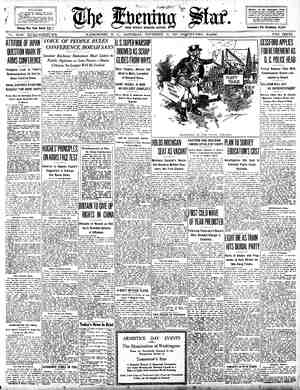The evening world. Newspaper, November 19, 1921, Page 13
You have reached the hourly page view limit. Unlock higher limit to our entire archive!
Subscribers enjoy higher page view limit, downloads, and exclusive features.
a4 ? f TWO SECTIONS. SATURDAY, NOVEMBER 19, 1921. SECTION ‘TWO. THE SIGNED MASTERPIECE By FREDERICK v ©. 142, on the south side of the N street, a high-stoop, English base- ment dwelling, was occupied by the widow of Amos P. Huntington. The departed, a drab, inoffensive little person, had blown himself into Eternity while compounding synthetic rubber. The relict was a little Dresden china affair; as evidence of her quality, she drove a smart plum-colored brougham, drawn by a smarter pair of roached hacks and on the box, when she was a-wheel, sat a coachman and footman in plum-color, two stern, middle-aged males. One by one the brown-stone residence, on the north side, which faced No. 142 and its few brave com- panions, had been converted into gar- ages and machine shops for sick mo- tors. Mrs. Huntington, in addition to these aggressions on her domestic peace, had suffered the further in- dignity of being dragged from her sheltered grief into open court by the insurance guarantors of her husband. Twice the little widow had won the s8ympathy of the jury who, in two suits, bad awarded her the full amount of the claim, a quarter of a million dol- lars. Directly across the street, in No. 143, yas a machine shop which in grime, cdor and noisy clamor differed in no respect from its neighbors, An observ- ant person might have noted that all of its mechanics were young, stood six feet, and weighed one hundred and e'ghty-five pounds, No. 143 was of the police; it was one of that series of carefully masked dead-falls which that arch man-hunter, Deputy Parr of Cen- ter Street, had planted in unexpected corners throughout the city. At ten, of an early winter morning, # car of some consequence came to a jerky sputtering stop, sighed and died, at the curb in front of No, 143, The driver, a man of six feet, weighing, say 185 pounds, got down, opened the hood, and stood regarding his ailing motor with the forlorn look of a medico whose patient has gone beyond his skill, A red-headed mechanic came out, evinced sympathetic interest, put his head under the hood. “The Chief,” said the driver, bending down and speaking in the mechanic’s ear, ‘wants a report on Number 142.” The mechanic reconnected a high- tension wire with a spark plug, thus restoring the consequential power to its full faculties, if an emergency arose. He tore a blue ticket in two, along a Inne of perforation, handed one half to -the chauffeur and tied the other half by a stout cord to the windshield of the automobile. The chauffeur strolled away to a back-room haunt of chauf- teurs and mechanics, to while away a few hours getting acquainted. The me- chanic resumed tinkering. An hour later Mrs. Amos P. Hunt- ington descended the steps and entered her brougham. Her footman wrapped her in moleskin and mounted the box; her mincing pair moved off. At this moment the red-headed mechanic feemed to come to the-decision that a@ trial rum was necessary. He started his hypochondriac motor, and rolled long in the wake of the plum-colored brougham. ‘ At Columbus Circle the traffic sig- nal fell against the plum-colored broug- Yam and the horses came to a stop, . Illustrated by WILL B. JOHNSTONE snorting motors on all sides instantly piling up. The attention of a man in a brown derby on the sidewalk was arrested by the flapping blue ticket on the windshield of the motor direetly behind the brougham. He halted at the curb, and casually took off his brown derby and mopped his forehead. The red-headed mechanic answered by blowing his nose in a red bandanna, and stared abstractedly at the plum- colored brougham. The traffic sluices opened, the jam started to move. But the red-headed mechanic turned east, and in ten minutes was back to No. 143. “Does any one follow, Willam?" asked the Dresden china widow in her telephone, “No, ma'am,” responded William, the footman, speaking out of the corner of iis mouth, without moving his lips, into the receiver at his shoulder. “There was one,” he added, encourag- ingly. ‘The mechanic opposite—but he turned off.” HAT afternoon two studious young men, bearing heavy instruments, called at No. 142 to, test the elec- tric meter. Shiny instruments were “THERE,” SAID THE MOTORMAN, “I THINK THAT MAN 18 DEAD. WINDOW FOR THIRTY-SIX HOURS.” IRVING ANDERSON . High Tension Thrills in This Tale of the’ Work of the New York Detective Bureau Toward Trapping This Society Beauty, Who Is Very Much “Suspect” spread out on the baserment stairway, with the interested servants watching and now and then obligingly handing the two scientists, by request, tools whose nickel-plated surfaces had been «specially prepared for finger-prints, The next day telephone linemen asked for and received permision to Dass through the house to the rvof to un- tangle wires. An inspector for the water department, a most entertaining fellow, inspected taps for leaks. A dis- pute having arisen in some obscure quarter as to encroachment ,on the Luilding lige, a young man must enter HE'S BEEN SITTING IN THAT ee re







